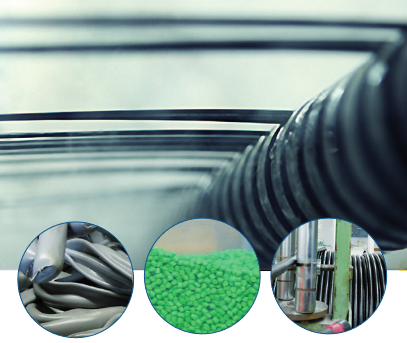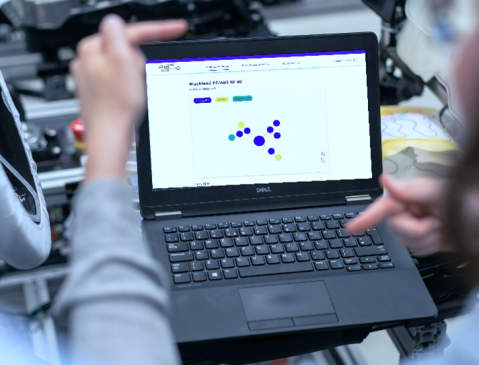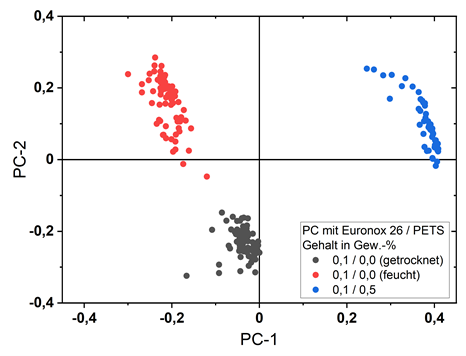DiLink research enables plastics producers to create high-quality products from recycled plastics, avoid plastic waste and close material cycles. To this end, the latest sensor technologies and digital software solutions are being developed and linked in order to be able to collect, analyse and further develop valuable data on the quality of plastic waste and the recyclates produced from it, and to use this data in the right places.

Closed loops
DiLink contributes to the closing of material cycles in the plastics industry. The sensor technologies further developed in Di-Link and the digital solutions tailored to them will collect the data required to close material cycles and enable the dissemination and processing of the data obtained. In this way, a more resource saving model of plastics use can be established.
Currently, large quantities of secondary plastics - recyclates - cannot be processed at all or only to inferior products. Information deficits in the markets regarding the quality and availability of the recycled materials are a main reason for this. With the right data on the attributes and quantity of plastic residues and the recyclates produced from them, and with the possibility of passing on this data digitally along the value chain, plastics manufacturers, commercial enterprises and recyclers can be put in a position to keep such plastics in circulation as high-grade materials.
The large number of different sources of residual materials for recycling can be reflected in the product quality of the recyclates. Sometimes product properties vary from batch to batch. This can make processing difficult within the framework of the tailor-made processes of the producing companies. With the help of the DiLink-sensors to be developed, these fluctuations in product quality can be detected and avoided or digitally documented, so that recyclate purchasers can obtain the relevant information on the materials and thus procure the right material or adapt their processes accordingly.

Digital recycling solutions
In a first step, the exact needs of the industry are determined through interviews and on-site appointments. The corresponding solutions are then developed, mapped on the software side and connected in suitable systems, for example by using and testing them in company co-operations. At the same time, an assessment of the sustainability of the developed solutions is carried out to ensure that the effort does not exceed the potential benefit.
By means of DiLink’s innovative solution approaches, plastic recyclate can be used more safely and reliably in the future. The additional information, together with the rapid availability of digital data along the value-added chain, will enable companies to play a pioneering role in the rapidly growing recycling market and thus secure the international competitiveness of Germany as a business location.

Results (Status June 2022)
DiLinK App
Data on plastics are passed on by the manufacturer to the processing companies. This is usually done via the data sheets supplied. The DiLinK app goes one step further and creates a virtual image of the plastics, which provides the required data and makes it available to the relevant companies. Sensors determine the quality of the recyclates and provide evidence of the consistently high quality over the entire production period. The app enables communication of relevant quality parameters between recycler and plastics processing plant. With the data on the nature and quantity of plastic residues as well as the recyclates produced from them and a way to digitally pass this data along the value chain, plastics processing and commercial companies as well as recyclers can be enabled to keep such plastics in the cycle as high-quality recyclables. Complementary to this, expertise in recyclate preparation and processing can be displayed.
Digital process monitoring
Online spectroscopy is used to monitor process quality. It measures the light absorption of the plastic melt in the extruder. With suitable data analysis, changes in the plastic, e.g. due to thermal degradation, can then be detected or tracked. This information can be used to detect inhomogeneities in the waste material or to adjust process parameters such as temperature and torque. The applicability of the invention was tested for the special requirements of recompounding.
Business models
The increasing use of plastic recyclates changes the material and information exchange between the different actors of the value network of the plastic cycle. In order to integrate the DiLinK application and optimize the information flow between the actors, the role models of the different actors are further developed and a new value stream system is designed based on the business ecosystem design. Based on the DiLinK App, innovative and sustainable business models for the key roles are identified, focusing on the value proposition, revenue mechanics and value creation logic. Thus, new cooperative business models and novel roles in the overall system could be identified.
Interdisciplinary team of experts
An interdisciplinary team has been formed for this task. On the research side, the three-year project is carried out by SKZ - Das Kunststoff-Zentrum, the Research Institute for Rationalisation at RWTH Aachen University (FiR) and the Wuppertal Institute for Climate, Environment and Energy (consortium leader). From the industry, the company partners INFOSIM, experts in the field of industrial software development, as well as the companies Hoffmann + Voss and MKV Kunststoffgranulat, which have extensive experience in plastics recycling, are involved.
The solutions developed from DiLink research can be used by the entire plastics processing industry as well as by other companies where plastic waste is generated to provide or use more recycled plastics.
Publications
Bendix,P., Berg, H., Hoeborn, G., Ivanda., A.: Kunststoffe digital besser recyclen, UmweltMagazin (2023), S. 24-26: https://www.ingenieur.de/wp-content/uploads/2023/09/UmweltMagazin_9-10_2023_UMW-9-10-2023.pdf
2. Policy Brief (03/11/2022)
1. Policy Brief (05/26/2020)
Article in the "Magazin 320°" (04/01/2020)
Article in "Spektrum der Wissenschaft" (02/19/2020)
Article in the "K Zeitung Online" (01/28/2020)
Project flyer of the funding measure (German / English) (March 2021)
The project flyers offer an insight into the contents and goals of the ReziProK projects and present first results in each case.
Project sheets of the funding measure (German) (August 2019)
The project sheets provide a brief overview of the individual projects and their goals.
Contributions to the ReziProK Transfer Conference in June 2022
Poster (German) (June 2022)
Presentation (German) (June 2022)
Contribution to the ReziProK Kick-off event in December 2019
Poster - in German (December 2019)
Article in the journal 320° - in German (01.04.2020)
Article in Spektrum der Wissenschaft - in German (19.02.2020)
Artikel in der K Zeitung Online (28.01.2020)
Picture credits: Wuppertal Institut für Klima, Umwelt, Energie gGmbH; HOFFMANN + VOSS GmbH Wuppertal Institut für Klima, Umwelt, Energie gGmbH
